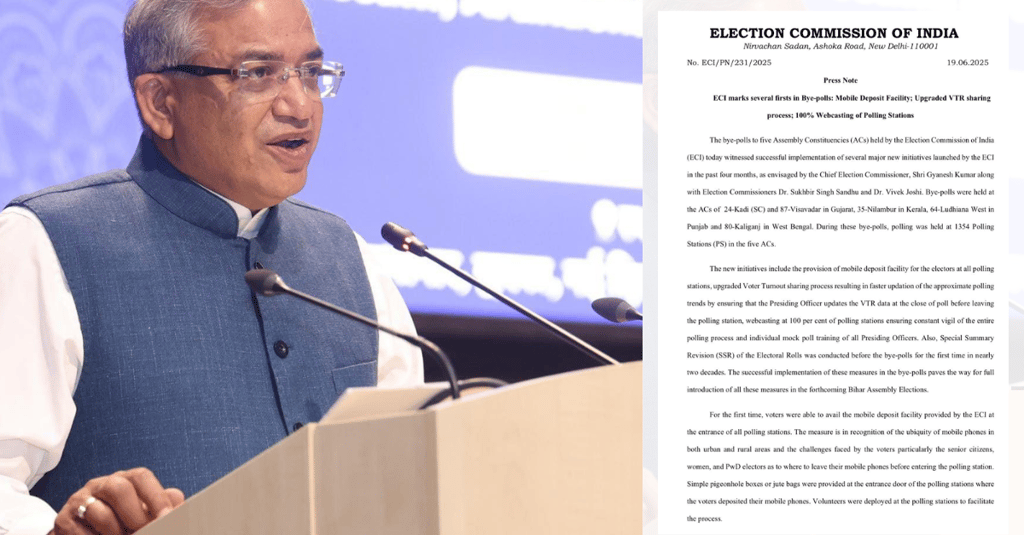ECI sets new benchmarks in bye-polls with mobile deposits, real-time voter data and full webcasting
The Election Commission also conducted a Special Summary Revision (SSR) of the Electoral Rolls ahead of the bye-polls; something that hadn’t been done before a bye-election in nearly 20 years.
NATIONAL


The Election Commission of India (ECI) has made history during the recently concluded bye-elections in five Assembly Constituencies by successfully rolling out several new and innovative measures aimed at improving the voting experience and enhancing the transparency of the polling process. The bye-polls, held on June 19 in Gujarat, Kerala, Punjab, and West Bengal, saw the introduction of initiatives that could become standard practice in future elections, including the upcoming Bihar Assembly polls.
Polling was held in 24-Kadi (SC) and 87-Visavadar in Gujarat, 35-Nilambur in Kerala, 64-Ludhiana West in Punjab, and 80-Kaliganj in West Bengal, covering a total of 1354 polling stations. This was the first time that 100% of polling stations in these constituencies were brought under web surveillance. The webcasting helped election officials keep an eye on live polling-day activities, adding a layer of transparency and ensuring smooth conduct.
One of the most appreciated steps among voters was the Mobile Deposit Facility. For the first time ever, voters were allowed to deposit their mobile phones safely before entering polling booths. Simple yet effective tools like pigeonhole boxes or jute bags were placed at the entrances. This especially helped senior citizens, women, and persons with disabilities who often struggle with handling their phones at polling stations where mobiles are not allowed. Volunteers were also stationed to assist with the process.
In another significant move, the Voter Turnout Reporting (VTR) process saw a major upgrade. Using the ECINET app, Presiding Officers entered voter turnout figures every two hours directly from polling stations. Importantly, the final turnout data was updated before they left the booths, eliminating long delays that were common in the past. Earlier, these figures would be manually collected by Sector Officers, relayed to Returning Officers through phone calls or texts, and only later uploaded to the central system. This new system ensures faster, more accurate updates, even in areas with poor mobile connectivity, as the app allows offline entries that sync once the network is available.
The Election Commission also conducted a Special Summary Revision (SSR) of the Electoral Rolls ahead of the bye-polls; something that hadn’t been done before a bye-election in nearly 20 years. This ensured a cleaner and more updated list of eligible voters.
To ensure fair practices, individual mock poll training sessions were given to all Presiding Officers. These sessions helped them become more confident and efficient in managing the polling day responsibilities.
With these initiatives, Chief Election Commissioner Shri Gyanesh Kumar and Election Commissioners Dr. Sukhbir Singh Sandhu and Dr. Vivek Joshi have introduced meaningful reforms that reflect the Commission’s focus on voter convenience, quicker data updates, and process integrity.
